新概念英语第一册课文翻译及学习笔记Lesson51_56
新概念第一册51课笔记内容
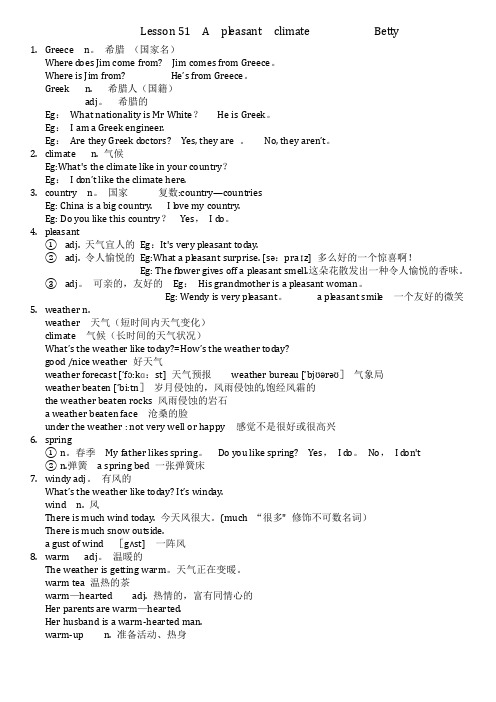
Lesson 51 A pl easant climate Betty1.Greece n。
希腊(国家名)Where d oes Jim come from? Jim comes from Greece。
Where is Jim from? He’s from Greece。
Greek n. 希腊人(国籍)adj。
希腊的Eg:What nationality is Mr White?He is Greek。
Eg:I am a Greek engineer.Eg:Are they Greek d octors? Yes, they are 。
No, they aren’t。
2.climate n. 气候Eg:What's the climate like in your country?Eg:I d on’t like the climate here.3.country n。
国家复数:country—countriesEg: China is a big country. I l ove my country.Eg: Do you like this country?Yes,I d o。
4.pl easant①adj. 天气宜人的Eg:It's very pl easant today.②adj. 令人愉悦的Eg:What a pl easant surprise.[sə:praɪz] 多么好的一个惊喜啊!Eg: The fl ower gives off a pl easant smell.这朵花散发出一种令人愉悦的香味。
③adj。
可亲的,友好的Eg:His grandmother is a pl easant woman。
Eg: Wendy is very pl easant。
a pl easant smil e 一个友好的微笑5.weather n.weather 天气(短时间内天气变化)climate 气候(长时间的天气状况)What’s the weather like today?=How’s the weather today?good /nice weather 好天气weather forecast [‘fɔ:kɑ:st] 天气预报weather bureau[‘bjʊərəʊ]气象局weather beaten [‘bi:tn]岁月侵蚀的,风雨侵蚀的,饱经风霜的the weather beaten rocks 风雨侵蚀的岩石a weather beaten face 沧桑的脸und er the weather : not very well or happy 感觉不是很好或很高兴6.spring①n。
新概念英语第一册51课课文
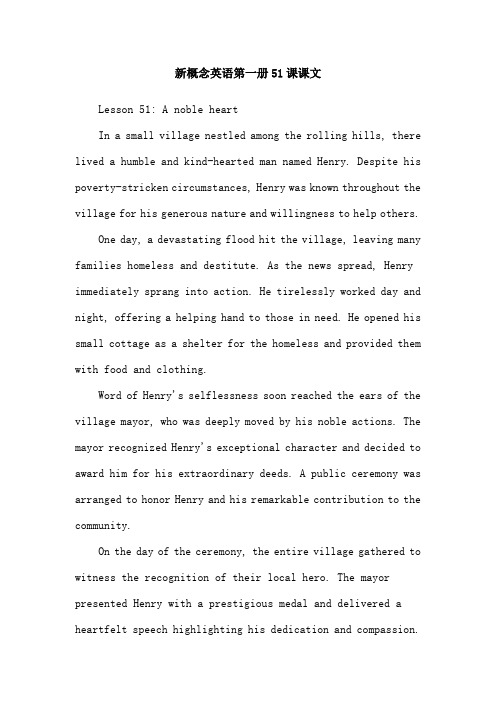
新概念英语第一册51课课文Lesson 51: A noble heartIn a small village nestled among the rolling hills, there lived a humble and kind-hearted man named Henry. Despite his poverty-stricken circumstances, Henry was known throughout the village for his generous nature and willingness to help others. One day, a devastating flood hit the village, leaving many families homeless and destitute. As the news spread, Henry immediately sprang into action. He tirelessly worked day and night, offering a helping hand to those in need. He opened his small cottage as a shelter for the homeless and provided them with food and clothing.Word of Henry's selflessness soon reached the ears of the village mayor, who was deeply moved by his noble actions. The mayor recognized Henry's exceptional character and decided to award him for his extraordinary deeds. A public ceremony was arranged to honor Henry and his remarkable contribution to the community.On the day of the ceremony, the entire village gathered to witness the recognition of their local hero. The mayor presented Henry with a prestigious medal and delivered a heartfelt speech highlighting his dedication and compassion.The villagers applauded thunderously, expressing their gratitude for Henry's unwavering support during the crisis. In his acceptance speech, Henry humbly shared, 'I am honored and grateful for this recognition, but it is not the medal that matters to me. What truly matters is the well-being and happiness of my fellow villagers. I believe that we should all lend a helping hand when others are in need. Together, we can overcome any challenge and create a stronger, more compassionate community.'Henry's words resonated deeply with everyone present. Inspired by his profound wisdom, the villagers pledged to follow his example and pay it forward. They vowed to lend their support to anyone in need, fostering a sense of unity and generosity within the village.From that day forward, Henry's legacy lived on, and the spirit of compassion thrived in the village. Whenever a crisis struck, the villagers rallied together, providing assistance and comfort to those affected. Henry's noble heart had ignited a spark within each villager, reminding them of the power of kindness and the difference a single person can make in the lives of many.As time passed, the village flourished, not only inmaterial wealth but also in the richness of its community spirit. The bond between the villagers grew stronger, and their willingness to support one another became the foundation of their success.Henry's story serves as a timeless reminder that it is not wealth or status that defines a person's worth but rather the goodness of their heart and their willingness to make a positive impact on the lives of others. In a world often overshadowed by self-interest, Henry's noble heart stands as a shining example of the transformative power of compassion, forever etched in the hearts and minds of the villagers.。
新概念英语第一册课文翻译及学习笔记Lesson51
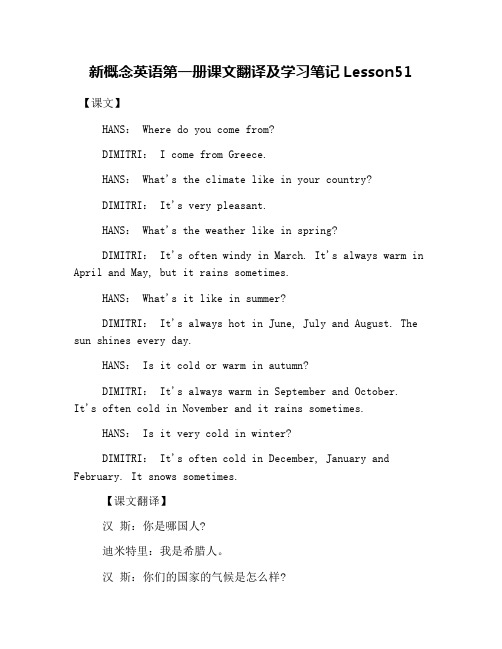
新概念英语第一册课文翻译及学习笔记Lesson51【课文】HANS: Where do you come from?DIMITRI: I come from Greece.HANS: What's the climate like in your country?DIMITRI: It's very pleasant.HANS: What's the weather like in spring?DIMITRI: It's often windy in March. It's always warm in April and May, but it rains sometimes.HANS: What's it like in summer?DIMITRI: It's always hot in June, July and August. The sun shines every day.HANS: Is it cold or warm in autumn?DIMITRI: It's always warm in September and October.It's often cold in November and it rains sometimes.HANS: Is it very cold in winter?DIMITRI: It's often cold in December, January and February. It snows sometimes.【课文翻译】汉斯:你是哪国人?迪米特里:我是希腊人。
汉斯:你们的国家的气候是怎么样?迪米特里:气候非常宜人。
汉斯:春季的天气怎么样?迪米特里:3月里常常刮风。
4月和5月的天气总暖洋洋的,但有时下雨。
汉斯:夏季的天气如何呢?迪米特里:6月、7月和8月的天气总是炎热的每天都出太阳。
新概念英语第一册Lesson51~56重点语法
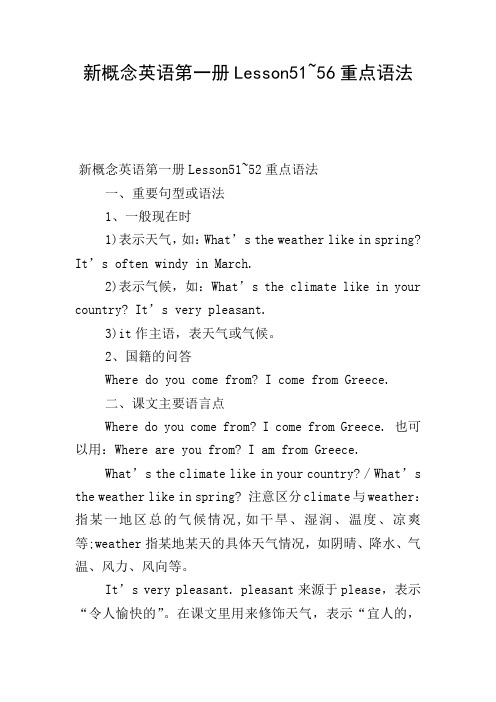
新概念英语第一册Lesson51~56重点语法新概念英语第一册Lesson51~52重点语法一、重要句型或语法1、一般现在时1)表示天气,如:What’s the weather like in spring? It’s often windy in March.2)表示气候,如:What’s the climate like in your country? It’s very pleasant.3)it作主语,表天气或气候。
2、国籍的问答Where do you come from? I come from Greece.二、课文主要语言点Where do you come from? I come from Greece. 也可以用:Where are you from? I am from Greece.What’s the climate like in your country? / What’s the weather like in spring? 注意区分climate与weather:指某一地区总的气候情况,如干旱、湿润、温度、凉爽等;weather指某地某天的具体天气情况,如阴晴、降水、气温、风力、风向等。
It’s very pleasant. pleasant来源于please,表示“令人愉快的”。
在课文里用来修饰天气,表示“宜人的,舒适的”。
It’s often windy in March. 此处可介绍表天气的名词及其形容词的变化,即在名词后加后缀-y。
此外,也可以介绍一年中12个月份的表达,可顺便介绍12个月的历史故事。
Its’ always warm in April and May, but it rains sometimes. 句中的sometimes一般位于助动词后面和实意动词前面,此处放在句末,主要是其强调作用。
What’s it like in summer? 句中的it指代天气。
新概念英语第一册L51~52

Lesson 51 ~ 52 A pleasant climate◆词汇详解(1) Greece n. 希腊希腊人Greek(2) climate n. 气候e.g. What’s the climate/weather like? 气候/天气如何?(3) country n. 国家也可解释为:乡村(4) pleasant adj. 宜人的宜人的气候pleasant climate【学生版不出现】n. pleasure 荣幸 e.g. It’s my pleasure. 是我的荣幸。
(5) weather n. 天气[U](6) spring n. 春季(7) windy adj. 有风的风n. wind云n. cloud 多云的adj. cloudy(8) warm adj. 温暖的反义词:cool 而cold 对应的反义词是hot(9) rain v. 下雨adj. rainy(10) sometimes adv. 有时e.g. 有时,我坐车去上学。
Sometimes I go to school by car.(11) summer n. 夏天暑假summer holiday(12) autumn n. 秋天也可说:fall(13) winter n. 冬天寒假winter holiday(14) snow v. 下雪adj. snowy(15)一月二月三月四月五月六月January February March April May June七月八月九月十月十一月十二月July August September October November December!重点语法国家、国籍及语言"China n. 中国Chinese n. 中国人n. 汉语adj. 中国的e.g. I come from China. I am Chinese. I can speak Chinese. I like Chinese food."其他国家国家America Brazil Holland England France American Brazilian Dutch English French 国籍、语言n.……的adj.国家Italy Norway Russia Spain Sweden Italian Norwegian Russian Spanish Swedish 国籍、语言n.……的adj.国家Germany Japan Korea Canada IndiaGerman Japanese Korean Canadian Indian 国籍、语言n.……的adj.#试一试:1. 我来自加拿大。
(完整版)新概念英语第一册Lesson51-54讲解和练习
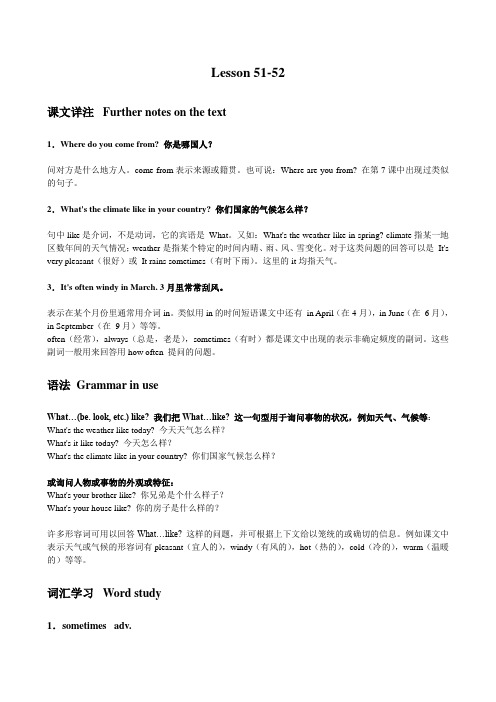
Lesson 51-52课文详注Further notes on the text1.Where do you come from? 你是哪国人?问对方是什么地方人。
come from表示来源或籍贯。
也可说:Where are you from? 在第7课中出现过类似的句子。
2.What's the climate like in your country? 你们国家的气候怎么样?句中like是介词,不是动词,它的宾语是What。
又如:What's the weather like in spring? climate指某一地区数年间的天气情况;weather是指某个特定的时间内晴、雨、风、雪变化。
对于这类问题的回答可以是It's very pleasant(很好)或It rains sometimes(有时下雨)。
这里的it均指天气。
3.It's often windy in March. 3月里常常刮风。
表示在某个月份里通常用介词in。
类似用in的时间短语课文中还有in April(在4月),in June(在6月),in September(在9月)等等。
often(经常),always(总是,老是),sometimes(有时)都是课文中出现的表示非确定频度的副词。
这些副词一般用来回答用how often 提问的问题。
语法Grammar in useWhat…(be. look, etc.) like? 我们把What…like? 这一句型用于询问事物的状况,例如天气、气候等:What's the weather like today? 今天天气怎么样?What's it like today? 今天怎么样?What's the climate like in your country? 你们国家气候怎么样?或询问人物或事物的外观或特征:What's your brother like? 你兄弟是个什么样子?What's your house like? 你的房子是什么样的?许多形容词可用以回答What…like? 这样的问题,并可根据上下文给以笼统的或确切的信息。
新概念英语第一册课文翻译及学习笔记Lesson51~56
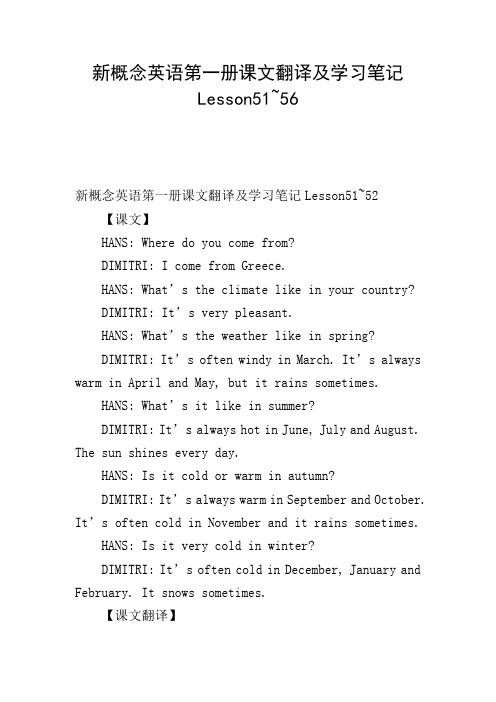
新概念英语第一册课文翻译及学习笔记Lesson51~56新概念英语第一册课文翻译及学习笔记Lesson51~52 【课文】HANS: Where do you come from?DIMITRI: I come from Greece.HANS: What’s the climate like in your country?DIMITRI: It’s very pleasant.HANS: What’s the weather like in spring?DIMITRI: It’s often windy in March. It’s always warm in April and May, but it rains sometimes.HANS: What’s it like in summer?DIMITRI: It’s always hot in June, July and August. The sun shines every day.HANS: Is it cold or warm in autumn?DIMITRI: It’s always warm in September and October. It’s often cold in November and it rains sometimes.HANS: Is it very cold in winter?DIMITRI: It’s often cold in December, January and February. It snows sometimes.【课文翻译】汉斯:你是哪国人?迪米特里:我是希腊人。
汉斯:你们的国家的气候是怎么样?迪米特里:气候非常宜人。
汉斯:春季的天气怎么样?迪米特里:3月里常常刮风。
4月和5月的天气总暖洋洋的,但有时下雨。
汉斯:夏季的天气如何呢?迪米特里:6月、7月和8月的天气总是炎热的每天都出太阳。
新概念英语第一册笔记51-60教学内容

新概念英语第一册笔记51-60新概念英语第一册笔记Lesson 51 Apleasant climate一、单词讲解1、GreeceGreece n. 希腊(国名)eg. Where does Jim come from?eg. Jim comes from Greece.eg. Where is Jim from?He’s from Greece.Greek n. 希腊人(国箱) adj. 希腊的eg. What nationality is Mr. White?He is Greek.eg. I am a Greek engineer.eg. Are they Greek doctors?Yes, they are.No, they aren’t.2、climateclimate n. 气候eg. What’s the climate like in your country? eg. I don’t like the climate here.3、countrycountry n. 国家eg. China is a big country.eg. Do you like this country?Yes, I do.4、pleasantpleasant1) adj. 天气宜人的eg. It’s quite pleasant today.2) adj. 令人愉悦的eg. What a pleasant surprise! 多么好的一个惊喜呀!eg. The flower gives off a pleasant smell. 这支花散发出一种令人愉悦的香味。
3)adj. 可亲的,友好的eg. Her mother is a pleasant woman.eg. Wendy is very pleasant.a pleasant smile4、weatherweather n. 天气(短时间内天气变化)climate n. 气候(长时间的天气状况)eg. What’s the weather like today?good weather 好天气=nice weatherweather forecast 天气预报weather bureau 气象局under the weather: not very well or happy 感觉不是很好或不是很高兴weather beaten:岁月侵蚀的,饱经风霜的the weather beaten rocks:风雨侵蚀的岩石a weather beaten face:沧桑的脸4、spring收集于网络,如有侵权请联系管理员删除spring1) n. 春季eg. My father likes spring.eg. Do you like spring?Yes, I do.No, I don’t.2) n. 弹簧5、windywindy adj. 有风的eg. What’s the weather like today?eg. It’s windy.wind n. 风eg. There is much wind today. 今天风很大。
新概念英语第一册lesson51-5245196学习资料

四。.明星大挑战,看谁最闪亮!(3分钟)
* ( )1---What's the ______ like today? ---Cloudy.
A.sky B.air nd D.weather **( )2. ---We never know ______ he is from.
---They say he comes from Italy.
n.希腊 n.气候 n.国家 adj.宜人的 n.天气 n.春季 adj.有风的 adj.温暖的 v.下雨 adv.有时 n.夏天 n.秋天 n.冬天 v.下雪
January /`ʤæ njuәri/ February /`februәri/ March /ma:ʧ/ April /`eiprәl/ May /mei/ June /ʤu:n/ July /ʤu`lai/ August /`ɔ:gәst/ September /sep`tembә/ October /ɔk`tәubә/ November /nәu`vembә/ December /di`sembә/
• 分类:实义动词分: 跟有宾语的及物动词和 不跟宾语的不及物动词。
• 另外:连系动词也是实义动词,但连系动词不 能单独构成谓语,其后必须跟有表语。
3. 实义动词的用法: (1)实义动词用于单数第三人称作主语时,
词末要加-s或-es
Every day he goes to work by bike. (2)用于其它各人称时则用动词原形。
• 2. I come from Norway, but you _c_om_e__ from England.
• 3. He comes from France, but she __co_m_e_s from England.
新概念英语第一册56课课文原文

新概念英语第一册56课课文原文《新概念英语第一册》第56课的课文原文如下:Lesson 56 The best and the worst.Many things in life are good, many are bad. There are many ways of doing things, some of which are good, some of which are bad. Some people are kind, others are unkind. Some people are honest, others are dishonest. Some people are polite, others are rude. Some people are generous, others are mean. Some people are helpful, others are unhelpful. Some people are considerate, others are inconsiderate. Some people are patient, others are impatient. Some people are courageous, others are cowardly. Some people are confident, others are shy. Some people are optimistic, others are pessimistic. Some people are ambitious, others are not. Some people are hardworking, others are lazy. Some people are responsible, others are irresponsible. Some people are reliable, others are unreliable. Some people are disciplined, others areundisciplined. Some people are organized, others are disorganized. Some people are punctual, others are always late. Some people are tidy, others are messy. Some people are calm, others are easily upset. Some people are flexible, others are inflexible. Some people are adventurous, others are cautious. Some people are open-minded, others areclose-minded. Some people are fair, others are unfair. Some people are forgiving, others are resentful. Some people are humble, others are arrogant. Some people are content,others are always wanting more. Some people are grateful, others are ungrateful. Some people are joyful, others are constantly unhappy.In conclusion, life is full of contrasts. It is up tous to choose the best and avoid the worst.。
新概念第一册课文电子版带译文Lesson1-Lesson51
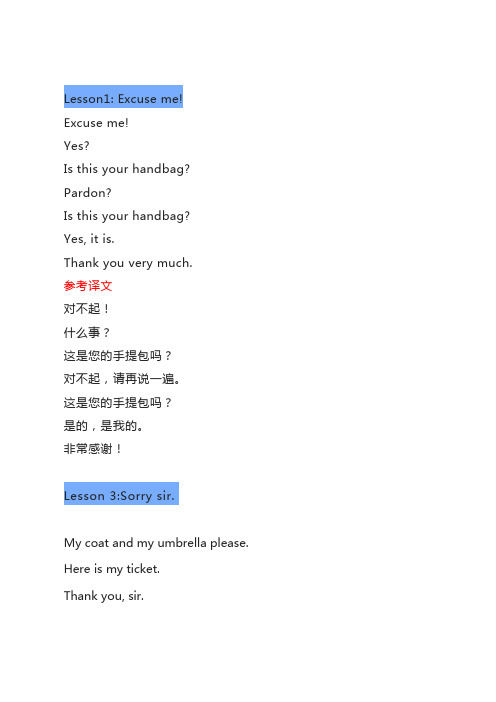
Lesson1: Excuse me!Excuse me!Yes?Is this your handbag? Pardon?Is this your handbag?Yes, it is.Thank you very much.参考译文对不起!什么事?这是您的手提包吗?对不起,请再说一遍。
这是您的手提包吗?是的,是我的。
非常感谢!Lesson 3:Sorry sir.My coat and my umbrella please. Here is my ticket.Thank you, sir.Number five.Here's your umbrella and your coat. This is not my umbrella.Sorry sir.Is this your umbrella?No, it isn't.Is this it?Yes, it is.Thank you very much.参考译文请把我的大衣和伞拿给我。
这是我(寄存东西)的牌子。
谢谢,先生。
是5号。
这是您的伞和大衣这不是我的伞。
对不起,先生。
这把伞是您的吗?不,不是!这把是吗?是,是这把非常感谢。
Lesson 5: Nice to meet you.MR. BLAKE: Good morning.STUDENTS: Good morning, Mr. Blake.MR. BLAKE: This is Miss Sophie Dupont.Sophie is a new student. She is French.MR. BLAKE: Sophie, this is Hans. He is German.HANS: Nice to meet you.MR. BLAKE: And this is Naoko. She's Japanese.NAOKO: Nice to meet you.MR. BLAKE: And this is Chang-woo. He's Korean.CHANG-WOO: Nice to meet you.MR. BLAKE: And this is Luming. He is Chinese.LUMNG: Nice to meet you.MR. BLAKE: And this is Xiaohui. She's Chinese, too.XIAOHUI: Nice to meet you.参考译文布莱克先生:早上好。
新概念英语第一册51课课文原文
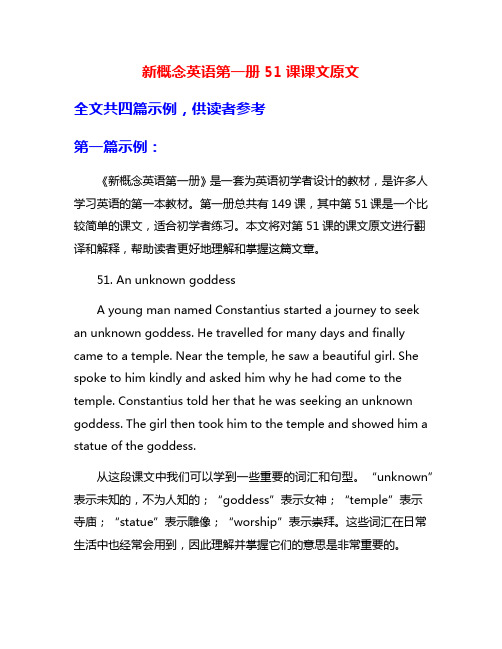
新概念英语第一册51课课文原文全文共四篇示例,供读者参考第一篇示例:《新概念英语第一册》是一套为英语初学者设计的教材,是许多人学习英语的第一本教材。
第一册总共有149课,其中第51课是一个比较简单的课文,适合初学者练习。
本文将对第51课的课文原文进行翻译和解释,帮助读者更好地理解和掌握这篇文章。
51. An unknown goddessA young man named Constantius started a journey to seek an unknown goddess. He travelled for many days and finally came to a temple. Near the temple, he saw a beautiful girl. She spoke to him kindly and asked him why he had come to the temple. Constantius told her that he was seeking an unknown goddess. The girl then took him to the temple and showed him a statue of the goddess.从这段课文中我们可以学到一些重要的词汇和句型。
“unknown”表示未知的,不为人知的;“goddess”表示女神;“temple”表示寺庙;“statue”表示雕像;“worship”表示崇拜。
这些词汇在日常生活中也经常会用到,因此理解并掌握它们的意思是非常重要的。
除了词汇外,这段课文还包含了一些常用的句型。
“A young man named Constantius started a journey to seek an unknown goddess.”这句话的结构是主语+谓语+宾语+定语从句,可以帮助我们学习并掌握这样的句型结构。
新概念英语第一册51课课文原文

新概念英语第一册51课课文原文英文回答:Lesson 51: Yet."Yet" is a conjunction that is used to connect two clauses. It can be used to mean "in addition" or "even though."In the first clause, the speaker says that he has a lot of work to do. In the second clause, he says that he isstill going to go to the party. The conjunction "yet" connects the two clauses and shows that the speaker is going to go to the party even though he has a lot of work to do.Here are some other examples of how "yet" can be used:I have a lot of work to do, yet I'm still going to go to the party.I'm not feeling well, yet I'm still going to go to work.I don't have any money, yet I'm still going to buy a new car.中文回答:第 51 课,Yet.“Yet” 是一个连接词,用于连接两个分句。
它可以表示“此外”或“即使”。
在第一个分句中,说话者说他有很多工作要做。
新概念英语第一册翻译
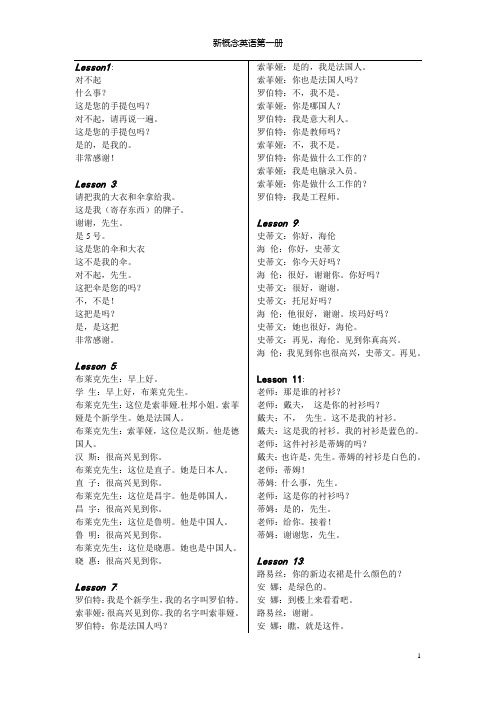
史蒂文:再见,海伦。见到你真高兴。
海伦:我见到你也很高兴,史蒂文。再见。
Lesson 11:
老师:那是谁的衬衫?
老师:戴夫,这是你的衬衫吗?
戴夫:不,先生。这不是我的衬衫。
戴夫:这是我的衬衫。我的衬衫是蓝色的。
老师:这件衬衫是蒂姆的吗?
戴夫:也许是,先生。蒂姆的衬衫是白色的。
肉商:这羔羊肉很好。
伯德夫人:我喜欢羔羊肉,可我丈夫不喜欢。
肉商:来点牛排吗?这块很好。
伯德夫人:就请给我那块吧。
伯德夫人:再来一磅绞肉。
肉商:您要买只鸡吗,伯德夫人?这些鸡很好。
伯德夫人:不要了,谢谢。
伯德夫人:我丈夫喜欢牛排,但他不喜欢鸡。
肉商:说老实话,伯德夫人,
我也不喜欢鸡。
lesson51
鲁明:很高兴见到你。
布莱克先生:这位是晓惠。她也是中国人。
晓惠:很高兴见到你。
Lesson 7:
罗伯特:我是个新学生,我的名字叫罗伯特。
索菲娅:很高兴见到你。我的名字叫索菲娅。
罗伯特:你是法国人吗?
索菲娅:是的,我是法国人。
索菲娅:你也是法国人吗?
罗伯特:不,我不是。
索菲娅:你是哪国人?
罗伯特:我是意大利人。
索耶夫人每天呆在家里。她料理家务。她总是在正午吃午饭。
下午,她总是会见她的朋友。她们经常在一起喝茶。
傍晚,孩子们放学回家。他们到家很早。索耶先生下班回家。他到家很晚。
晚上,孩子们总是做作业,然后去睡觉。索耶先生总是读报纸,但有时和他的妻子一起看电视。
lesson57
现在是8点钟。孩子们每天都乘小汽车去上学,而今天,他们正步行上学。
售货员:就要这些吗?
(完整word版)新概念英语第一册~课文及翻译

Lesson 1 Excuse me! 课文1 对不起!1。
Excuse me!对不起2。
Yes?什么事?3。
Is this your handbag?这是您的手提包吗?4. Pardon?对不起,请再说一遍。
5。
Is this your handbag?这是您的手提包吗?6。
Yes, it is。
是的,是我的。
7. Thank you very much.非常感谢!Lesson 3 Sorry, sir。
$课文3 对不起,先生。
8。
My coat and my umbrella please。
请把我的大衣和伞拿给我.9。
Here is my ticket.这是我(寄存东西)的牌子.10。
Thank you, sir。
谢谢,先生。
11。
Number five。
是5号.12. Here's your umbrella and your coat.这是您的伞和大衣13. This is not my umbrella。
这不是我的伞。
14。
Sorry sir。
对不起,先生.15。
Is this your umbrella?这把伞是您的吗?16. No, it isn't.不,不是!17。
Is this it?这把是吗?18。
Yes, it is.是,是这把19. Thank you very much。
非常感谢.Lesson 5 Nice to meet you $课文5 很高兴见到你。
20。
Good morning。
早上好。
21. Good morning, Mr。
Blake。
早上好,布莱克先生。
22. This is Miss Sophie Dupont。
这位是索菲娅。
杜邦小姐.23. Sophie is a new student.索菲娅是个新学生。
24. She is French。
她是法国人.25。
Sophie, this is Hans.索菲娅,这位是汉斯.26。
新概念英语第一册课文翻译及学习笔记Lesson51~56
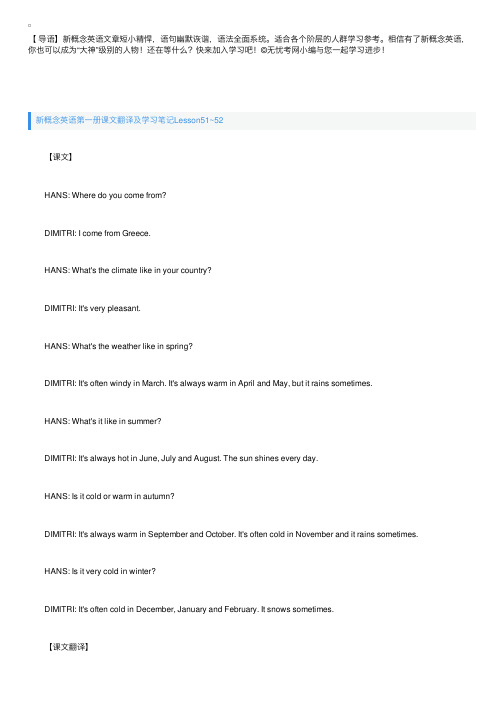
【导语】新概念英语⽂章短⼩精悍,语句幽默诙谐,语法全⾯系统。
适合各个阶层的⼈群学习参考。
相信有了新概念英语,你也可以成为“⼤神”级别的⼈物!还在等什么?快来加⼊学习吧!©⽆忧考⽹⼩编与您⼀起学习进步!新概念英语第⼀册课⽂翻译及学习笔记Lesson51~52 【课⽂】 HANS: Where do you come from? DIMITRI: I come from Greece. HANS: What's the climate like in your country? DIMITRI: It's very pleasant. HANS: What's the weather like in spring? DIMITRI: It's often windy in March. It's always warm in April and May, but it rains sometimes. HANS: What's it like in summer? DIMITRI: It's always hot in June, July and August. The sun shines every day. HANS: Is it cold or warm in autumn? DIMITRI: It's always warm in September and October. It's often cold in November and it rains sometimes. HANS: Is it very cold in winter? DIMITRI: It's often cold in December, January and February. It snows sometimes. 【课⽂翻译】 汉斯:你是哪国⼈? 迪⽶特⾥:我是希腊⼈。
- 1、下载文档前请自行甄别文档内容的完整性,平台不提供额外的编辑、内容补充、找答案等附加服务。
- 2、"仅部分预览"的文档,不可在线预览部分如存在完整性等问题,可反馈申请退款(可完整预览的文档不适用该条件!)。
- 3、如文档侵犯您的权益,请联系客服反馈,我们会尽快为您处理(人工客服工作时间:9:00-18:30)。
新概念英语第一册课文翻译及学习笔记Lesson51~56 新概念英语第一册课文翻译及学习笔记Lesson51~52【课文】HANS: Where do you come from?DIMITRI: I come from Greece.HANS: What's the climate like in your country?DIMITRI: It's very pleasant.HANS: What's the weather like in spring?DIMITRI: It's often windy in March. It's always warm in April and May, but it rains sometimes.HANS: What's it like in summer?DIMITRI: It's always hot in June, July and August. The sun shines every day.HANS: Is it cold or warm in autumn?DIMITRI: It's always warm in September and October. It's often cold in November and it rains sometimes.HANS: Is it very cold in winter?DIMITRI: It's often cold in December, January and February. It snows sometimes.【课文翻译】汉斯:你是哪国人?迪米特里:我是希腊人。
汉斯:你们的国家的气候是怎么样?迪米特里:气候非常宜人。
汉斯:春季的天气怎么样?迪米特里:3月里常常刮风。
4月和5月的天气总暖洋洋的,但有时下雨。
汉斯:夏季的天气如何呢?迪米特里:6月、7月和8月的天气总是炎热的每天都出太阳。
汉斯:秋季的天气是冷还是暖呢?迪米特里:9月和10月总是很暖和,11月常常就冷了,而且有时下雨。
汉斯:冬季的天气很冷吗?迪米特里:12月、1月和2月常常很冷,有时还下雪。
【生词】Greece n. 希腊climate n. 气候country n. 国家pleasant adj. 宜人的weather n. 天气spring n. 春季windy adj. 有风的warm adj. 温暖的rain v. 下雨sometimes adv. 有时summer n. 夏天autumn n. 秋天winter n. 冬天snow v. 下雪January n. 1月February n. 2月March n. 3月April n. 4月May n. 5月June n. 6月July n. 7月August n. 8月September n. 9月October n. 10月November n. 11月December n. 12月【知识点讲解】1. 这节课的生词比较多,不过明天就是周末了,大家花两天时间好好记忆一下吧!这节课的单词中我们学到了四季和12个月份的表达方式,是很重要的词汇哦!2. Where do you come from? 意思是“你从哪儿来?”“你是哪儿人?” 也可以说成“Where are you from?” 意思一样。
3. What's the climate like in your country? 你们国家的气候怎么样? 这里的like用作是介词,不是动词,它的宾语是what,意思类似“像……”而不是用作动词时所表达的“喜欢”的含义。
4. always, often, sometimes 这三个词都是表示频率。
其中always最频繁、often其次,sometimes只表示有时候。
新概念英语第一册课文翻译及学习笔记Lesson53~54【课文】HANS: Where do you come from?JIM: I come from England.HANS: What's the climate like in your country?JIM: It's mild, but it's not always pleasant.The weather's often cold in the North and windy in the East.It's often wet in the West and sometimes warm in the south.HANS: Which seasons do you like best?JIM: I like spring and summer. The days are long and the nights are short. The sun rises early and sets late.I don't like autumn and winter. The days are short and the nights are long. The sun rises late and sets early.Our climate is not very good, but it's certainly interesting.It's our favourite subject of conversation.【课文翻译】汉斯:你是哪国人?吉姆:我是英国人。
汉斯:你们国家的气候怎么样?吉姆:气候温和,但也不总是宜人的。
吉姆:北部的天气常常寒冷,东部则常常利风。
西部常下雨,南部有时则很暖和。
汉斯:你最喜欢哪些季节?吉姆:我最喜欢春季和夏季。
因为此时白天长而夜晚短,太阳升得早而落得晚。
我不喜欢秋天和冬天。
因为那时白天短、夜晚长,太阳升得晚、落得早虽然我们国家的气候并不很好,但又确实很有意思。
天气是我们最喜欢谈论的话题。
【生词】mild adj. 温和的,温暖的always adv. 总是north n. 北方east n. 东方wet adj. 潮湿的west n. 西方south n. 南方season n. 季节best adv. 最night n. 夜晚rise v. 升起early adv. 早set v. (太阳)落下去late adv. 晚,迟interesting adj. 有趣的,有意思的subject n. 话题conversation n. 谈话【知识点讲解】1. 今天的单词依旧比较多,大家要加油咯!东南西北的表达是一组,联合起来记比较容易。
另外“在北方”这样的表达是:in the north, 介词用in.2. mild这个单词除了可以用以形容气候温和,也可以形容人的脾气好。
3. 今天额外再出一道题,考察一下大家对助动词的掌握,下次公布答案。
我们都知道“你从哪里来?”应该说Where do you come from? 那么“他/她从哪里来?” 这句话要怎么翻译呢?新概念英语第一册课文翻译及学习笔记Lesson55~56【课文】The Sawyers live at 87 King Street.In the morning, Mr. Sawyer goes to work and the children go to school. Their father takes them to school everyday.Mrs. Sawyer stays at home every day. She does the housework.She always eats her lunch at noon.In the afternoon, she usually sees her friends. They often drink tea together.In the evening, the children come home from school. They arrive home early.Mr. Sawyer comes home from work. He arrives home late.At night, the children always do their homework. Then they go to bed.Mr. Sawyer usually reads his newspaper, but sometimes he and his wife watch television.【课文翻译】索耶一家住在国王街87号。
早上,索耶先生去上班,孩子们去上学。
父亲每天送孩子们去上学。
索耶夫人每天呆在家里。
她料理家务。
她总是在正午吃午饭。
下午,她总是会见她的朋友。
她们经常在一起喝茶。
傍晚,孩子们放学回家。
他们到家很早。
索耶先生下班回家。
他到家很晚。
晚上,孩子们总是做作业,然后去睡觉。
索耶先生总是读报纸,但有时和他的妻子一起看电视。
【生词】live v. 住,生活stay v. 呆在,停留home n. 家;adv. 到家housework n. 家务lunch n. 午饭afternoon n. 下午usually adv. 通常together adv. 一起evening n. 晚上arrive v. 到达night n. 夜间【知识点讲解】1. the saywers 意思是指“索亚一家人”。
在英语中把姓氏加上复数,再在前面加the就能表示这一家人的意思。
比如The Youngs,就代表“杨家”。
2. 表示大的时段的单词,比如morning, noon, afternoon和evening,前面的介词都用in。
比如in the morning, in the afternoon... 只有表示夜晚那个单词night,要用at night.3. go to school 意思是上学,在school前面不加the;come home或者是go home,这里都不用to和the.4. They arrive home early. 这句话里的home和early都是副词,用来修饰和补充arrive 这个动词。
